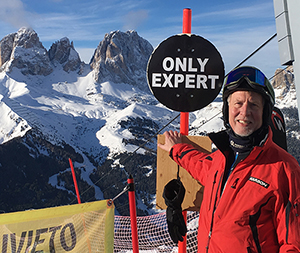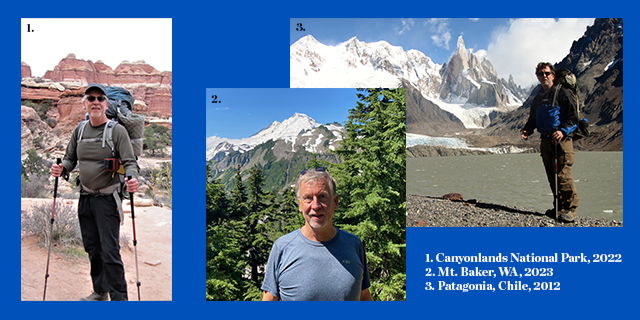Toxicology grad thankful for KU’s impact on career

Doug Cox’s career took him to the mountain top and around the world. With gratitude, the 1986 Pharmacology & Toxicology Ph.D. graduate has left a generous IRA gift to the School of Pharmacy.
A native of rural south-central New York, Cox is another example of a KU Pharmacy graduate who found a career outside the traditional path. Oh, and what a path he took! Berkeley, Seattle, Denver, Australia and San Antonio were stops along the way. Residing back in Denver, where he feeds his passion for the outdoors, mountain climbing, backpacking and skiing, Cox is toward the end of a productive and rewarding environmental toxicology career that included 25 years consulting and a dozen years with governmental entities. None of it, he says, would have happened without the education he received at KU.
“My time in Lawrence and that particular degree gave me my career,” said Cox. “I've never stopped appreciating the benefits I got from the School of Pharmacy.” That’s why he worked with KU Endowment to designate a portion of his retirement funds to the school to benefit the future of pharmacy education.
Not far from where he earned his undergraduate degree from the State University of New York Geneseo lies the Love Canal—a neighborhood of Niagara Falls made famous for one of the first widely publicized environmental disasters in America. That notoriety got Cox’s attention and sparked an interest in environmental science that eventually brought him to KU and the Pharmacology and Toxicology doctoral program.
“Nobody knew about contaminated sites,” Cox said. “They were burying drums of chemical waste by the thousands, willy nilly and walking away. Love Canal was the first designated Superfund site.”
With his Pharmacology & Toxicology Ph.D. in hand, Cox spent a year at the University of Vermont in a postdoctoral fellowship, then took his first job with the California Health Department living in Berkeley, California. “I had the bottom half of a house that looked directly at the Golden Gate Bridge, and I thought, ‘this all paid off.’ I'd never been to California before, and here I am staring out at the Golden Gate Bridge.”
While in California, Cox visited Yosemite National Park and fell in love with an outdoor lifestyle. He found that his knowledge of toxicology afforded him the privilege of exploring other desirable locations to live, work and explore. After two years with the state of California, he began his first stint in industrial consulting first in Berkeley and then in Seattle.
“I was the first generation of environmental toxicologists who were involved in trying to understand how chemicals move in the subsurface soil and groundwater and how they get into people’s water, air, plants and food. The EPA was just getting their heads around this, and I was in on this early before there were regulations to evaluate the risks. KU gave me a really good background and scientific thought process—how to formulate a hypothesis, and how to understand toxicology documents and scientific studies.”
Because there were few people with his expertise in the field, Cox could take his pick in jobs. They took him to Denver where he enjoyed the benefits of the Rockies and a truly unexpected stop in Melbourne, Australia. He still marvels at how he managed that transition without a cell phone, the Internet or experience driving on the opposite side of the road.
After his experience down under, Cox bounced between U.S. government positions and consulting gigs. Two different assignments with the Air Force and five years with the Bureau of Land Management (BLM) earned him a government pension and status as a subject matter expert. The Air Force was dealing with leaking underground fuel tanks and chemical runoff from cleaning airplanes with cancer-causing trichloroethylene (TCE). Meanwhile BLM had issues with soil and water contamination from decades of waste from the mining industry.
More recently, Cox has served as an expert witness for the federal government, helping to evaluate risk for chemicals at different military facilities across the country. “That’s the progression,” he says. “You can’t be an expert witness until you’re gray-haired.”
As he winds down, he’s pleased to work with KU Endowment to pay it forward. “I always considered putting KU in my will, but it seemed a lot cleaner to make them part of my IRA. There’s less encumbrance than dealing with an estate. When I pass away, the IRA is just clean. It goes to the beneficiaries.”
He says working with the Endowment staff has been “extraordinarily easy” and he’s glad that his resources will be going to further advance science. “I think understanding science is critical to understanding some of the key issues of our time, and these funds can help provide opportunity for young scientists, whether they go into environmental toxicology or pharmaceutical research.”
From Alaska to Patagonia to Switzerland, Doug Cox has enjoyed outdoor adventure thanks to hard work and a career established at the University of Kansas. He found it gratifying to work in a field that protects the environment, and he’d like to see others get those opportunities. He jumps at the chance to encourage others to follow him to KU and the great outdoors. “Both have been huge in my life. Find something you love to do and then go outside in this fabulous country of ours and enjoy the national parks, the mountains and all that wonderful scenery.”
